
A postmark is a postal marking made on an envelope, parcel, postcard or the like, indicating the place, date and time that the item was delivered into the care of a postal service, or sometimes indicating where and when received or in transit. Modern postmarks are often applied simultaneously with the cancellation or killer that marks postage stamps as having been used. Sometimes a postmark alone is used to cancel stamps, and the two terms are often used interchangeably. Postmarks may be applied by handstamp or machine, using methods such as rollers or inkjets, while digital postmarks are a recent innovation.

The United States Postal Service (USPS), also known as the Post Office, U.S. Mail, or Postal Service, is an independent agency of the executive branch of the United States federal government responsible for providing postal service in the U.S., including its insular areas and associated states. It is one of the few government agencies explicitly authorized by the Constitution of the United States. The USPS, as of 2021, has 516,636 career employees and 136,531 non-career employees.

The United States Post Office Department was the predecessor of the United States Postal Service, established in 1792. From 1872 to 1971, it was officially in the form of a Cabinet department. It was headed by the postmaster general.

A ZIP Code is a system of postal codes used by the United States Postal Service (USPS). Introduced on July 1, 1963, the basic format consisted of five digits. In 1983, an extended ZIP+4 code was introduced; it included the five digits of the ZIP Code, followed by a hyphen and four digits that designated a more specific location.

Dead letter mail or undeliverable mail is mail that cannot be delivered to the addressee or returned to the sender. This is usually due to lack of compliance with postal regulations, an incomplete address and return address, or the inability to forward the mail when both correspondents move before the letter can be delivered. Largely based on the British model that emerged in the late eighteenth century, many countries developed similar systems for processing undeliverable mail.
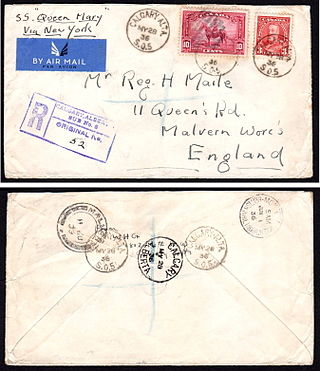
Registered mail is a mail service offered by postal services in many countries which allows the sender proof of mailing via a mailing receipt and, upon request, electronic verification that an article was delivered or that a delivery attempt was made. Depending on the country, additional services may also be available, such as:
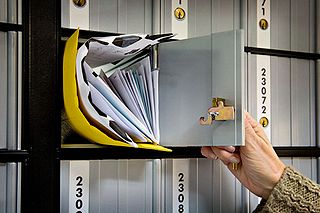
A post office box is a uniquely addressable lockable box located on the premises of a post office.

A letter box, letterbox, letter plate, letter hole, mail slot or mailbox is a receptacle for receiving incoming mail at a private residence or business. For outgoing mail, Post boxes are often used for depositing the mail for collection, although some letter boxes are also capable of holding outgoing mail for a carrier to pick up. Letterboxes or mailboxes use the following primary designs:
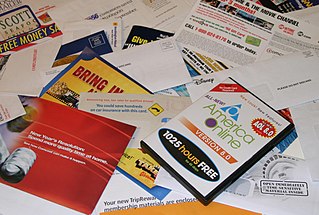
Advertising mail, also known as direct mail, junk mail, mailshot or admail, letterbox drop or letterboxing (Australia) is the delivery of advertising material to recipients of postal mail. The delivery of advertising mail forms a large and growing service for many postal services, and direct-mail marketing forms a significant portion of the direct marketing industry. Some organizations attempt to help people opt out of receiving advertising mail, in many cases motivated by a concern over its negative environmental impact.

The recycling of paper is the process by which waste paper is turned into new paper products. It has a number of important benefits: It saves waste paper from occupying homes of people and producing methane as it breaks down. Because paper fibre contains carbon, recycling keeps the carbon locked up for longer and out of the atmosphere. Around two-thirds of all paper products in the US are now recovered and recycled, although it does not all become new paper. After repeated processing the fibres become too short for the production of new paper, which is why virgin fibre is frequently added to the pulp recipe.
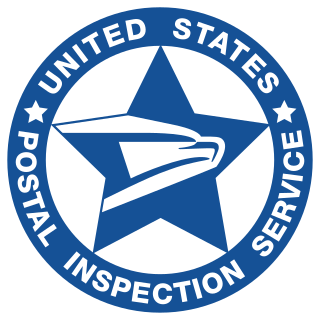
The United States Postal Inspection Service (USPIS), or the Postal Inspectors, is the federal law enforcement arm of the United States Postal Service. It supports and protects the U.S. Postal Service, its employees, infrastructure, and customers by enforcing the laws that defend the nation's mail system from illegal or dangerous use. Its jurisdiction covers any crimes that may adversely affect or fraudulently use the U.S. Mail, the postal system or postal employees. With roots going back to the late 18th century, the USPIS is the oldest continuously operating federal law enforcement agency.

Rural Free Delivery (RFD), since 1906 officially rural delivery, is a program of the United States Post Office Department to deliver mail directly to rural destinations. The program began in the late 19th century. Before that, people living in rural areas had to pick up mail themselves at sometimes distant post offices or pay private carriers for delivery.

Military mail, as opposed to civilian mail, refers to the postal services provided by armed forces that allow serving members to send and receive mail. Military mail systems are often subsidized to ensure that military mail does not cost the sender any more than normal domestic mail. In some cases, military personnel in a combat zone may post letters and packages to their home country free of charge. Modern military mail services are provided by most armed forces around the world. In some nations, individual service branches may run their own military mail program.
Click-N-Ship is a service offered by the United States Postal Service that allows customers to create pre-paid Priority Mail shipping labels on ordinary printer paper. The labels include delivery confirmation numbers to track date and time of delivery or attempted delivery. Other than the cost of postage, there is no fee to create labels for Priority Mail, Priority Mail Express, Global Priority Mail, or Global Express Mail if the sender uses USPS Flat Rate envelopes or boxes.
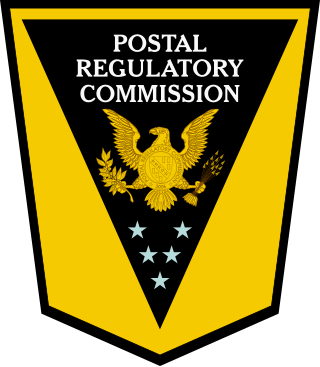
The United States Postal Regulatory Commission, formerly called the Postal Rate Commission, is an independent regulatory agency created by the Postal Reorganization Act of 1970. Like the Postal Service, it was defined in law as an independent establishment of the executive branch.
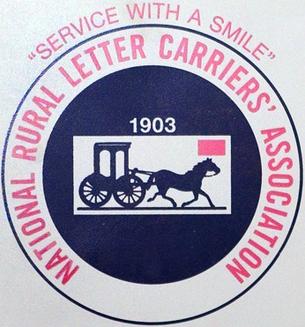
The National Rural Letter Carriers' Association (NRLCA) is an American labor union that represents the rural letter carriers of the United States Postal Service. According to its statutes, the purpose of the Association is to "improve the methods used by rural letter carriers, to benefit their conditions of labor with the United States Postal Service (USPS), and to promote a fraternal spirit among its members."
National Change of Address (NCOALink) "is a secure dataset of approximately 160 million permanent change-of-address (COA) records consisting of the names and addresses of individuals, families and businesses who have filed a change-of-address with the USPS". It is maintained by the United States Postal Service and access to it is licensed to service providers and made available to mailers. There are six licenses available including Full Service Providers and Limited Service Providers. The use of NCOALink is required in order to obtain bulk mail rates, as it minimizes the number of UAA mailpieces saving the mailer money and reducing the USPS's processing of this type of mail.

A sorting office or processing and distribution center is any location where postal operators bring mail after collection for sorting into batches for delivery to the addressee, which may be a direct delivery or sent onwards to another regional or local sorting office, or to another postal administration.
E-COM, short for Electronic Computer Originated Mail, was a hybrid mail process used from 1982 to 1985 by the U.S. Postal Service (USPS) to print electronically originated mail, and deliver it in envelopes to customers within two days of transmission.

The United States Postal Service (USPS) provides Priority Mail Express for domestic U.S. delivery, and offers two types of international Express Mail services, although only one of them is part of the EMS standard. One is called Priority Mail Express International and the other service is called Global Express Guaranteed (GXG). The latter has no relation to "EMS" International service as provided by the EMS Cooperative.


















